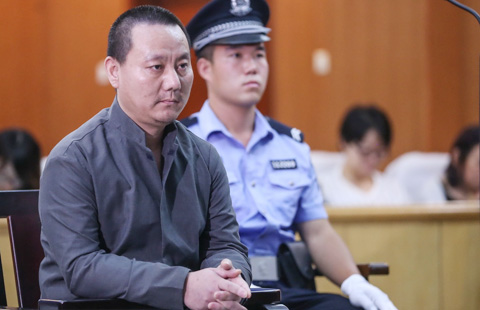Market heats up for e-cigarettes, largely produced in China, as US scrutiny rises
Updated: 2015-06-11 06:37
By William Hennelly(China Daily USA)
|
||||||||
While China has taken steps to reduce widespread cigarette smoking, it is also the source of most electronic cigarettes, an expanding global market for which a US senator has called for more oversight.
Oregon Senator Ron Wyden, in a letter on Monday to Meredith Broadbent, chairwoman of the US International Trade Commission (ITC), called for more statistical reporting on e-cigarette products with an eye toward future regulation.

Wyden, writing on behalf of the Senate Finance Committee, said e-cigarettes were a $2.5 billion market in the United States in 2014, according to a US General Accountability Office report.
The GAO report, citing industry experts, said that China, where the e-cigarette was invented, is the source of more than 90 percent of e-cigarette products.
"Although the health risks of these products are not fully known, the FDA (Food and Drug Administration) and the Centers for Disease Control and Prevention (CDC) have warned of their use," Wyden wrote. He said that the FDA wants to classify e-cigarettes and liquids as tobacco products.
"Currently, because they are not a traditional tobacco product, e-cigarettes and liquids can be sold without restriction to vulnerable segments of the population," Wyden wrote.
The CDC recently reported that use among US middle and high school students jumped from 4.5 percent of students in 2013 to 13.4 percent in 2014.
About 10 percent of US adults now "vape", the term for e-cigarette use, according to a Reuters/Ipsos poll conducted from May 19 to June 4. The poll found that almost 70 percent of users started in the last year, with about three quarters also smoking cigarettes.
The senator said that "the full extent of imports of e-cigarette and related liquids is unknown because these products, as well as e-cigarette components and intermediate chemicals used to manufacture nicotine-containing liquids, are not currently tracked under any regulatory or revenues system".
He said the products are "imported under broad basket categories where e-cigarettes are included with electrical equipment such as strobe lights and hand-held calorie counters".
Wyden wrote that he wants the ITC's Committee for Statistical Annotation of Tariff Schedules to adopt data for e-cigarette products.
Hon Lik, a pharmacist in China and once a heavy tobacco smoker, is considered the father of the e-cigarette.
Hon's path to creating the e-cigarette started after a night of bad dreams, he told the British newspaper The Guardian. When he awoke, Hon, who had been trying to kick his heavy smoking habit, realized he had been wearing his nicotine patch. He concluded that the best way to get nicotine was through some form of smoking.
In 2003, Hon created an electric ultrasound-emitting element to vaporize a pressurized jet of liquid containing nicotine, producing a smokelike vapor that contains nicotine.
Hon filed the first patent for the device in China in 2003, and the first e-cigarette was made that year in Beijing. It didn't have the vaporization system used today, but was based on atomization, which can vaporize liquids through the heat produced by a battery's electricity. Most e-cigarettes today use a battery-powered heating element.
"I believed [then] that if I could use vapor to simulate cigarette smoke, this could help me," Hon, who lost his father to lung cancer in 2004, told Reuters on Tuesday.
Hon, 59, works for one of the e-cigarette industry’s biggest players, Imperial Tobacco Group, based in Bristol, England, after its purchase in 2013 of his patents for $75 million, although he received only a fraction of the money, he told The Guardian.
The patents were held by Dragonite, a Hong Kong company that Hon set up with a Chinese investor. He now works for Fontem Ventures, Imperial's subsidiary in the Netherlands.
Imperial, the world's fourth-largest tobacco company, has purchased the Blu brand of e-cigarettes from Reynolds American Inc, a US tobacco holding company, in a deal expected to close this week. Philip Morris International, British American Tobacco and Japan Tobacco also are rushing to enter the market, which could top $7 billion this year.
"E-cigarettes are a consumer-driven revolution," Hon told Reuters. "When automotive manufacturers first started out, they were not thinking about a sport to be called Formula One. You always have groups of people who are looking for excitement."
The market for e-cigarettes in China in small, as tobacco is dominant. China is the world's top consumer of tobacco, a market dominated by state-owned China National Tobacco, which accounts for an estimated 10 percent of government revenue.
Hon told Reuters that more people in Beijing could start vaping, due to the June 1 implementation of strict rules on smoking in public. The fine for smoking in hospitals, schools, hotels and restaurants is 200 yuan ($32.25).
Hon said smaller cities in China could follow Beijing's lead as the government emphasizes public health.
"I understand the market is slowly changing," said Hon, who said that he smokes tobacco only when his job requires him to compare flavors of various tobaccos and vapes.
Contact the writer at williamhennelly@chinadailyusa.com

 Ten photos you don't wanna miss – June 18
Ten photos you don't wanna miss – June 18
 Man with 15 girlfriends charged with fraud
Man with 15 girlfriends charged with fraud
 Heavy rain, flood hit many parts of China
Heavy rain, flood hit many parts of China
 Muslims around the world mark first eve of holy month
Muslims around the world mark first eve of holy month
 Top 5 wealthiest women in technology
Top 5 wealthiest women in technology Warriors beat Cavaliers to clinch NBA title
Warriors beat Cavaliers to clinch NBA title
 Saving dogs from dog meat carnival
Saving dogs from dog meat carnival
 Ten photos you don't wanna miss - June 17
Ten photos you don't wanna miss - June 17
Most Viewed
Editor's Picks

|

|

|

|

|

|
Today's Top News
Talks seen as prelude to visit by President Xi to US in September
Gunman kills nine people in South Carolina church shooting
US House moves to revive Obama's Pacific trade pact
Hong Kong lawmakers reject election reform proposal
Lies and false hopes entrap Xinjiangers
China's economic strategy focus of panel
UN strategy for long term
topic of debate
Donald Trump announces bid for
US presidency
US Weekly

|

|







